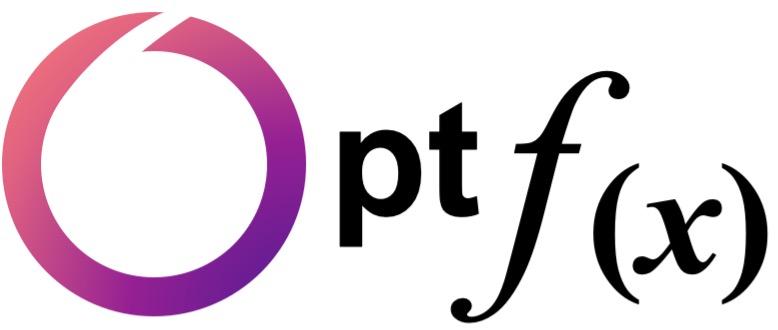Package optfx

opt f(x)
Motivation and significance
optfx is a module for the large scale field optimization platform based on FEniCS ecosystem. This module enables reusable and straightforward UFL coding for inverse problem of multi-physics.
This software is the third-party module of fenics project.
This software is based on Lagacy FEniCS (FEniCS2019.1.0). The new version, FEniCSx, is not supported.
Example
import numpy as np
import optfx as opt
opt.parameters["form_compiler"]["optimize"] = True
opt.parameters["form_compiler"]["cpp_optimize"] = True
opt.parameters['form_compiler']['quadrature_degree'] = 5
comm = opt.MPI.comm_world
m = 0.30 # Target rate of the material amount
p = 5 # Penalty parameter
eps = 1e-3 # Material lower bound
R = 0.01 # Helmholtz filter radius
n = 256 # Resolution
def k(a):
return eps + (1 - eps) * a ** p
mesh = opt.UnitSquareMesh(comm, n, n)
X = opt.FunctionSpace(mesh, 'CG', 1)
f = opt.interpolate(opt.Constant(1e-2), X)
class Initial_density(opt.UserExpression):
def eval(self, value, x):
value[0] = m
class Left(opt.SubDomain):
def inside(self, x, on_boundary):
gamma = 1/250 + 1e-5
return x[0] == 0.0 and 0.5 - gamma < x[1] < 0.5 + gamma and on_boundary
U = opt.FunctionSpace(mesh, 'CG', 1)
t = opt.TrialFunction(U)
dt = opt.TestFunction(U)
bc = opt.DirichletBC(U, opt.Constant(0.0), Left())
class PoissonProblem(opt.Module):
def problem(self, controls):
rho = controls[0]
rho = opt.helmholtzFilter(rho, X, R)
a = opt.inner(opt.grad(t), k(rho)*opt.grad(dt))*opt.dx
L = opt.inner(f, dt)*opt.dx
Th = opt.Function(U, name='Temperture')
opt.solve(a==L, Th, bc)
J = opt.assemble(opt.inner(opt.grad(Th), k(rho)*opt.grad(Th))*opt.dx)
rho_bulk = opt.project(opt.Constant(1.0), X)
rho_0 = opt.assemble(rho_bulk*opt.dx)
rho_total = opt.assemble(controls[0]*opt.dx)
rel = rho_total/rho_0
self.volumeFraction = rel
return J
def constraint_volume(self):
return self.volumeFraction - m
x0 = opt.Function(X)
x0.interpolate(Initial_density())
N = opt.Function(X).vector().size()
min_bounds = np.zeros(N)
max_bounds = np.ones(N)
setting = {'set_lower_bounds': min_bounds,
'set_upper_bounds': max_bounds,
'set_maxeval': 1000
}
params = {'verbosity': 1}
problem = PoissonProblem()
solution = opt.optimize(problem, [x0], {'constraint_volume': [0]}, setting, params)
Installation
Docker
We recomennd to use our docker image. First you should install docker.io or relavant systems. Our docker image was stored in the dockerhub.
If you use the docker.io and docker-compose, the following command pull and run the above image.
docker-compose up
install on your local host
First, make sure to install the following dependencies:
Second, install using pip.
pip install git+https://github.com/Naruki-Ichihara/fenics_optimize.git@main
Contributors
API and documentation
API: API Documentation: Docs
References
Cite
To cite this repository:
@software{fenics_optimize2023github,
author = {Naruki Ichihara},
title = {{optfx}: Large scale field optimization platform based on fenics in python},
url = {https://github.com/Naruki-Ichihara/fenics_optimize},
version = {0.3.0},
year = {2023},
}

Expand source code
#! /usr/bin/python3
# -*- coding: utf-8 -*-
"""
.. include:: ../README.md
"""
__version__ = "0.5.0.alpha"
from dolfin import *
from dolfin_adjoint import *
from .core import Module
from .utils import to_numpy, from_numpy
from .filters import helmholtzFilter, hevisideFilter, b2c
from .optimizer import OptimizerSub-modules
optfx.core-
The code is a Python module that defines an abstract class called Module. This class is the core of an optimization problem and defines the basic …
optfx.filters-
Some filters for topology optimization.
optfx.optimizer-
The optimize function computes the size of the optimization problem by summing the sizes of the initial conditions, and then creates an instance of …
optfx.utils-
Utiltes for optfx.




